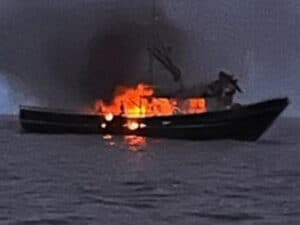
VIDEO: Iridium GMDSS service now operational
Written by Marine Log Staff
Iridium satellite constellation provides truly global coverage
Iridium Communications Inc. (NASDAQ: IRDM) reports that its long awaited Global Maritime Distress and Safety System (GMDSS) service commenced operation on Friday, December 11.
Iridium says that, with the launch of the service, it has, for the first time in history given seafarers “a real-time emergency response and rescue service that works everywhere in the world” and that “no other maritime emergency response system matches the coverage and real-time communications capability of the Iridium GMDSS service.”
GMDSS is an internationally regulated service, governed by the International Maritime Organization’s (IMO) Safety of Life at Sea (SOLAS) convention. It provides life-saving assistance to seafarers in distress and has required equipment on board more than 60,000 ships today, with many ships carrying multiple terminals.
Iridium’s service functions much like an international SOS button, however, unlike other options it includes as standard real-time emergency voice calling service, distress alert (SOS button) and maritime safety information with Iridium’s truly global coverage.
Iridium’s GMDSS service is built on the company’s upgraded $3 billion satellite network, completed in 2019, and utilizes the company’s L-band satellite spectrum. This spectrum serves as a weather-resilient complement to other satellite broadband capabilities on ships, aircraft and vehicles and is also a requirement for GMDSS terminals on SOLAS-class vessels.

The first Iridium GMDSS terminal available is the Lars Thrane LT-3100S, which combines the three key GMDSS services – distress alert, distress voice and MSI. It can be used for both primary and emergency ship communications. The combination of all three services in one cost-effective terminal is a first for the industry and one that makes the GMDSS even more accessible to smaller vessels that may not otherwise be able to afford the equipment.
Here’s how it works:
Once a vessel holds down the red ‘distress’ button, indicating that it needs assistance, a signal is immediately routed through the Iridium satellite network and delivered in moments to a designated Rescue Coordination Center (RCC). Unique to the Iridium system, this is then followed automatically by a distress phone call, allowing the vessel to immediately speak with the RCC. The RCC then can quickly understand the nature of the emergency, while also alerting nearby vessels and local search and rescue authorities to provide the required immediate assistance.
Iridium started the process to become a GMDSS service provider in 2013 and had to meet several objectives before formally ending what was a decades-long monopoly held by another satellite company. After being recognized by the IMO’s Maritime Safety Committee to provide GMDSS service, Iridium has worked closely with its regulator, IMSO, to meet all conditions required for service introduction. Aside from technical integrations around the world, this has included the signing of a Public Services Agreement with IMSO in April of 2019, which details the conditions for IMSO to act as regulator and maintain oversight of Iridium’s GMDSS services and a Letter of Compliance in December 2019 stating that Iridium was authorized to begin providing service when ready.




